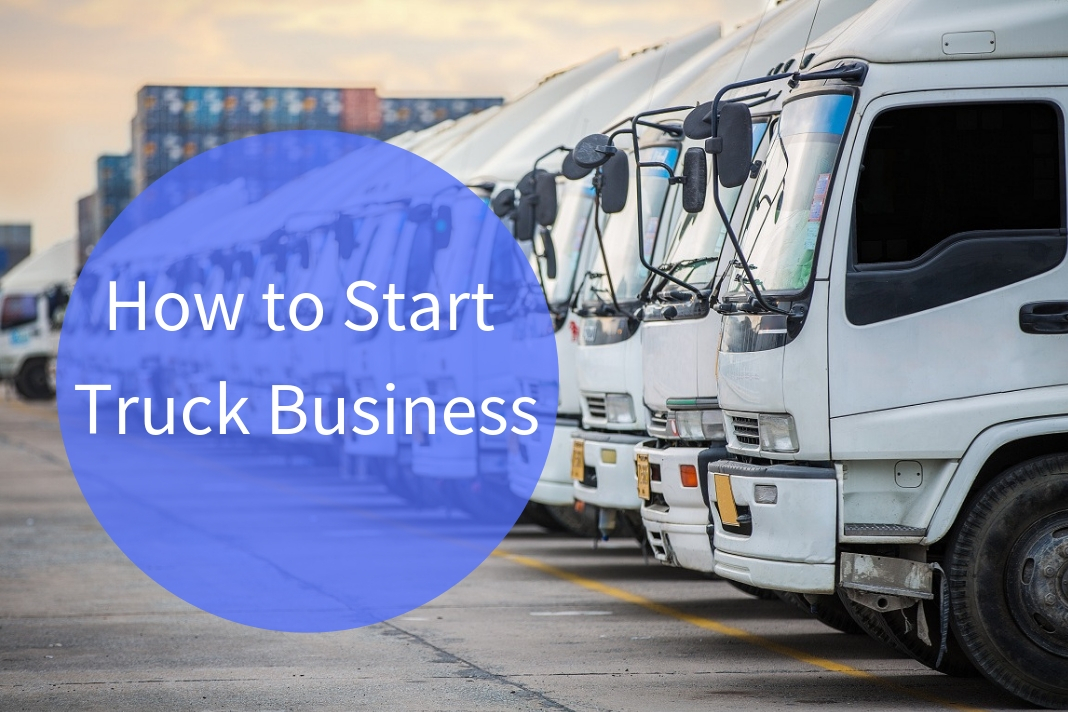
Trucking business can be extremely lucrative. You can start your business with just one truck. However, starting a trucking business is also risky. Many truck owners have failed within a year of their business start-up. But that doesn’t mean you cannot do it. You just need to have a sound business plan and set your goals right.
Don’t be intimidated with the bigger companies. Today we will walk you through the steps to start a trucking company. If it makes you happy, listen to this – most big truck companies operate with a small fleet of 4 to 6 trucks. Therefore, you have space to grow.
Apply for Your Trucking Business
You have to work according to the rules and regulations of state and federal authorities. Even though the paper works may seem tedious and long, this is extremely important. You don’t want to mess with the law, do you?
Obtain appropriate licenses and permits. The best place to get relevant and quick information is your local corporation authority. Your licenses and permits requirements will vary depending on the type of transportation business you want to start. If you are a US resident, you will need to register for a US DOT number before you apply to gain a trucking authority. It takes 25 days max to receive the DOT number from the Unified Registration System.
Moving forward, you should ensure to form your business as a legal entity. You have to register your business. You can either choose to start a Sole Proprietorship, a Limited-Liability Company, or a Corporation. You should know what kind of business entity would suit you; there are pros and cons to each type. Speak with a business consultant or an attorney to understand the legalities and the taxes behind each type.
Make sure there is an Attorney involved in your every business action to protect you from any potential legal issues.
Finally, you have to buy insurance coverage for your business. If you ever face a terrible incident, you’ll want someone or something to support you financially and mentally. Talk to a reliable insurance agent and find out the best policy for your new trucking business.
Buy Your Truck – Buy Just One in the Beginning
Well, you need a truck to start a Trucking business. You have to buy a truck that suits your business type and buying a commercial truck is not as easy as it seems. Here are some tips to that you can follow:
- There are different types of trucks available for different businesses. Do a thorough research before you come to a decision. Get in touch with truck owners for advice.
- Do not settle down with one place for purchasing your truck. Compare prices, features, and functionalities so that you know your investment was worthwhile.
- Negotiate your price. Most sellers start with a higher selling price. Negotiate to get the best value.
- Do not go for refurbished trucks. They prove to be a bigger burden in the longer run. While they are cost-effective, you don’t want your truck to run down in the middle of a highway, right?
- Hire a mechanic to inspect your vehicle. Get the truck inspected before you purchase it.
- Find a good deal by working out your business plan. You can ask for EMI options from your seller.
Leasing a truck often keeps the monthly costs to a minimum. You can lease a truck, in case you have a very tight budget. Each dealer offers different leasing options and restrictions. We suggest that you take time and search before selecting.
Liability insurance is required to cover potential damage or injuries caused by the truck. You also have to buy insurance for your truck in case it needs heavy repair work.
Buy the Right Equipment Trailer
Find the right trailer equipment type for your truck freight. The correct equipment to haul truck freight can influence your earnings significantly. Generally, most truck owners go with Flatbed Truck Loads as they typically pay the highest rate on average. However, you also have to keep in mind that freight rates change each month, if not weeks.
Before you choose your equipment type, consider the overall average by taking into account factors like location, speed, and time.
Other equipment types that equally pay better rates include Reefer, Van, and Step Deck.
Choose a Process Agent
You will need to hire a process agent who will handle all the legalities of your business. A process agent for each state your truck operates is a good option. Process agents are useful if there is an issue with the law and when court papers are involved. The process agents will be responsible for completing and processing all the legal documents, including Form BOC-3, on behalf of your trucking company.
Consider International Registering Plan (IRP)
If you want to get the permit to haul loads through different states, consider registering your vehicle through IRP at your home state. An IRP registration contains a separate license plate and cab-cards, appropriate for interstate traveling.
Depending upon your vehicle type, weight and operating state (and country), the registration fee for IRP will vary and fall in the range between $1,500 and $2,000.
Identify Your Niche Market
Your business should support the right market niche. Your market will determine the equipment you buy, the price you charge, your working hours and the freight lanes your service. Find a niche you can dominate; that is the best way to build and brand a business.
Also, since this is going to be a start-up trade, ensure you don’t try to become the jack of all trades. You may feel like you are giving up on customers by not promoting your services to other niches. On the other hand, if you try to work with a particular niche, you will be positioning yourself as a domain authority. If you specialize in one domain, you will be recognized as a master in that transportation service and henceforth eliminate tons of competition.
Niches that are common and that you can occupy include courier firms, refrigerated goods, moving and packing for hires and so on. You can establish in many markets. For instance hauling fruits, veggies, meats and other fresh produce in reefers could be an ideal start as it has less competition. It is a year-round work and will still operate under recessions.
Determine Your Rates
You have to consider many aspects when determining your charges. Your rates should be high enough to earn you a profit and pay your working capital, and low enough to swat any competition. Before you start calling shippers and market, you need to find your rates.
You have to charge rates that are competitive to brokers’ rates. It is quite simple to charge your rate. Select your preferred freight lane and connect with the load board. Identify ten loads going in the same direction. Contact their brokers and find out how much they pay. Repeat the process for the opposite direction.
Calculate an average and add 10% to 15% to it. The amount that reflects is the average price brokers charge to the shippers. Some tools can help determine the price per km or mile.
Calculate Your Cost of Operation
It is essential that you are aware of your operating costs. Your operating cost will determine your profit percentage.
There are two types of operating costs you need to calculate:
- Fixed Costs: These costs remain the same day after day, months after months. They include insurance premiums, rent, permits, truck payments, driver salary, etc.
- Variable Costs: These costs vary depending upon the wear and tear of the truck. These include fuel charges, bills, repairs and maintenance, meals while driving and other non-recurring expenses.
You can calculate your profit by deducting variable costs and fixed costs from your rates. Keep a margin of 10 plus or minus.
Market Your Business
Nowadays nothing works without marketing, branding, and promotion. With the advent of digital marketing, businesses’ marketing plans have considerably streamlined. You won’t get a load unless people know that you are on the market. You have to wear different hats, including a marketer and self-promotor until you are earning well enough to hire the right professionals.
Irrespective of how far and wide your business scatters, marketing is one of the crucial and recurring function of business that you need to employ.
You need to develop a solid marketing plan. If you have the kind of money, hire a consultant and discuss your ideas. Some of the cost-effective marketing strategies include:
- Use your social media accounts. Reach your potential customers by posting stuff on social media, using right tags, ad campaigns etc.
- Use cold calling approach.
- Connect with your clients directly through emails and text messages.
- Create an online presence by starting a website
- Display flyers and brochures in relevant places
- Establish a brand name by designing a logo and business card. Circulate them among your immediate social circle.
Your customers will take you a long way into the business; ensure you build a great rapport with them.
To start and grow any business, you need to work hard and put in lots of effort. Trucking business is no different. Use the steps and tips from our post and make your business start-up process easier and worry-free.




